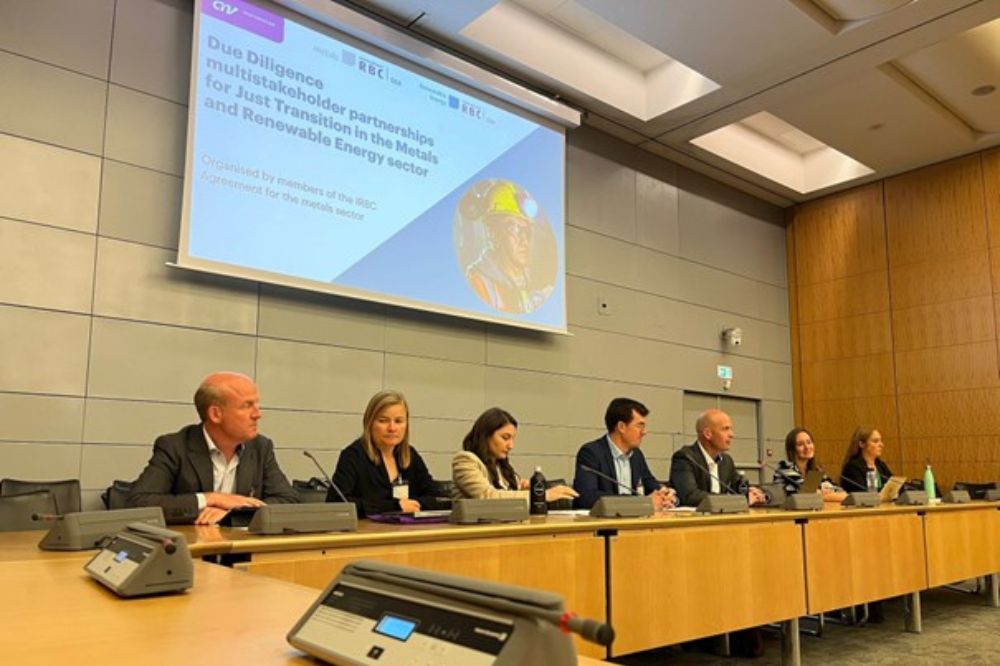Partner session on OECD Forum about multi-stakeholder partnerships for just transition
From 21 to 24 May 2024 the 17th edition of the OECD Forum on Responsible Mineral Supply Chains took place. Participants from the IRBC Agreements for the Renewable Energy Sector and the Metals Sector, together with the German Sector Dialogue, organised a partner session on the value of multi-stakeholder collaboration for a just transition.
 © SER
© SER
The need for collaboration
With the global energy transition and the exponential growth in demand for alternative energy sources, coal mines are closing. As a result, the demand for metals required for the energy transition is increasing. The positive trend to move towards renewable energy globally must be supported by a sustainable and responsible supply of metals. Partnerships are needed to ensure a just and sustainable transition. With panellist from different multi-stakeholder initiatives from the Netherlands and Germany, several unique multi-stakeholder approaches were presented.
Kumi Consulting, who moderated the panel discussions, opened the session. Whilst it is a cliché, there is truth in the often quoted African proverb: “if you want to go fast, go alone, if you want to go far, go together”. This is certainly true when it comes to addressing responsible supply chain issues; there is only so much that companies can do on their own.
Upcoming legislation
In a panel discussion with the secretariat of the German Sector Dialogues on Business and Human Rights, which facilitates dialogues in the automotive and energy sector, and the Dutch Ministry of Foreign Affairs, participant of the IRBC Agreements for the Metals and Renewable Energy Sector, the link between IRBC multi-stakeholder initiatives and the upcoming EU legislation were discussed. The Dutch ministry explained how voluntary initiatives like the IRBC Agreements form the back bone of the Dutch IRBC policy for the past 10 years, in which the government encourages sector-wide cooperation. Comparable to the IRBC Sector Agreements, the German government has set up multi-stakeholder platforms to prevent and mitigate human rights risks in the global supply chains of companies, with an impact-oriented approach.
Whilst these multi-stakeholder sector initiatives are an important vehicle for collaboration and addressing collective risks, there remains an individual responsibility for the implementation of due diligence by companies and the need to legislative measures in the field of due diligence. In fact, with the German Supply Chain Act, Germany already has due diligence legislation in place. There are however synergies between legislation and multi-stakeholder initiatives. Upcoming EU due diligence legislation does not only refer to sector initiatives as one potential tool, but requires companies to increase their leverage where possible through collaboration with other stakeholders.
Benefits of multi-stakeholder collaboration
SSE Renewables and the secretariat of the IRBC Agreements for the Metals and Renewable Energy Sector discussed the benefits of multi-stakeholder collaboration in the second panel discussion. For SSE Renewables the broad network of expertise and different stakeholders has been valuable. Knowledge sessions, working groups, projects and peer relationships, have already led to important actions and engagement opportunities. The value lies in working together, to tackle systemic human and environmental impacts in supply chains, recognising the power of mitigating them as a collective versus as an individual.
The secretariat of the IRBC Agreements observed that the multi-stakeholder collaboration has been important to build trust among stakeholders and creates a safe space to exchange challenges and best practices with regard to the implementation of due diligence. The Agreements contributed to the creation of awareness, knowledge and capacity building for companies in a very practical way. Through the Agreements, companies are offered tailor-made support with sector specific tools or guidance and with different approaches for the larger and smaller scaled companies. The practical way of working has led to different collective impact projects focusing on the secondary metals value chain in India to occupational health and safety in Andean mines.
Multi-stakeholder collaboration in practice
During the final panel discussion, Tata Steel Netherlands and trade union CNV Internationaal, both participants of the IRBC Agreement for the Metals Sector, elaborated on their project on occupational health and safety risks in Andean mines in Peru and Bolivia. CNV explained that their previous work in the sector and earlier research showed risks on labour conditions in de mining sector in Peru and Bolivia. For Tata Steel, collaborating with CNV was an opportunity to learn about due diligence in practice with an important stakeholder as well as an opportunity to engage in a constructive dialogue with local suppliers.
The collaboration has been successful so far, as both CNV and Tata Steel were able to open doors for each other. By working together, Tata Steel gained access to local unions and workers representatives, while CNV had the opportunity to engage with the employers. Mutual trust played an important and enabling role in the project. CNV and Tata Steel hope to make some positive impact in the next stage of the project, and will be sharing the results with other Agreement participants to share their learnings and enable other stakeholders to apply their approach in different contexts.
